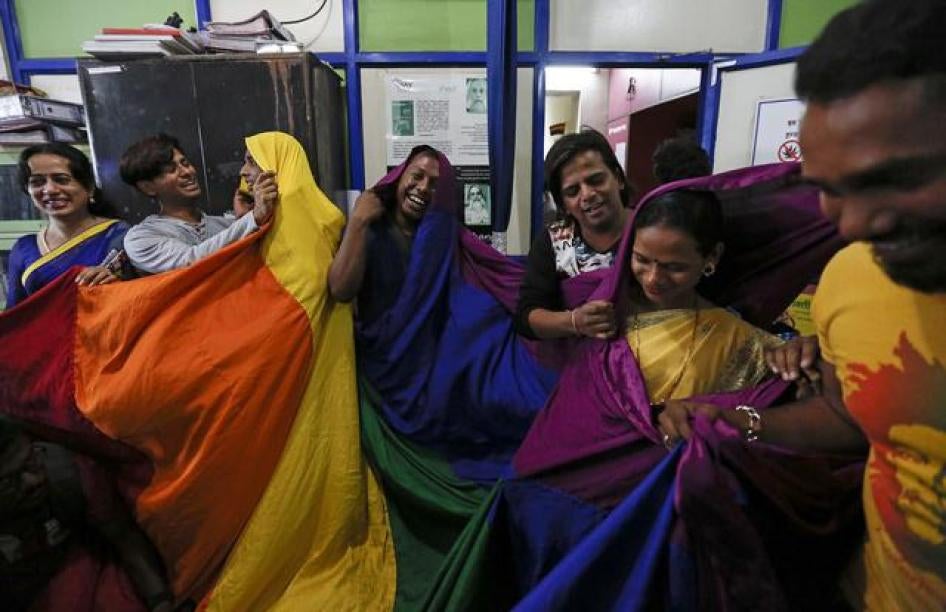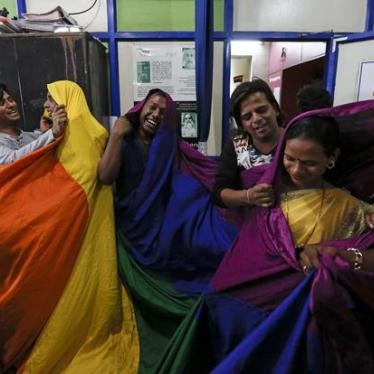In October 2017, India’s Godrej Industries hosted the release of global corporate standards to support the business community in ending discrimination against lesbian, gay, bisexual, trans and intersex (LGBTI) people, at their Mumbai headquarters.
As part of a panel to discuss the Standards of Conduct built around the United Nations Guiding Principles on Business and Human Rights, we took questions from the audience.
One young man, sitting at the back, had his hand raised for a long time. When it was his turn, he asked how, as a gay man, he could come out to his employers and colleagues so that he was not forever hiding a key part of himself in the workplace. “You must be true to yourself,” someone said. “But what if I lose my job?” the man responded.
It is this fear that India’s Supreme Court sought to address when it decided, on January 8, 2018, to review its earlier stance on section 377 of the penal code. That law in effect criminalizes adult consensual same-sex relationships by forbidding intercourse “against the order of nature.”
“What is natural to one may not be natural to the other,” the court said, pointing out that people “who exercise their choice should never remain in a state of fear.”
Indian activists and lawyers have long criticized the British colonial-era law, because it encourages discrimination against consensual adult same-sex relationships. The Supreme Court’s moves have seen both celebration and disappointment.
In 2009, much to the relief of LGBTI people and those that back their rights, after hearing a petition by the Naz Foundation, a group that supported HIV/AIDS programs in the gay community, the Delhi High Court rejected criminal penalties for same-sex conduct, finding that section 377 violated fundamental freedoms protected under the Indian Constitution.
However, disappointment followed when several religious groups and others appealed to the Supreme Court, which reinstated the law in 2013, contending that it is for the legislature to overturn the law. A subsequent effort by a member of parliament, Shashi Tharoor, to repeal the law was not adopted.
Meanwhile, activists and lawyers filed new petitions asking the Supreme Court to review its ruling. The Supreme Court also made important progress in protecting the rights of transgender communities and the right to privacy, which all have bearing on section 377.
Five well-known gay Indians argued that the “ability to be open with one’s friends, family, colleagues and employees about an integral and intrinsic part of one’s life and personality, is fundamental to unfold the full potential of the personality of any human being. Being open about one’s sexual orientation is essential to the pursuit of personal and professional success and happiness.”
Now, after the Supreme Court decided it would review its 2013 ruling, there is cause for hope again.
This is also an opportunity for Prime Minister Narendra Modi to show leadership. The Supreme Court has sent a notice to the government seeking its view. The previous administration, led by Prime Minister Manmohan Singh, had not opposed the Delhi High Court ruling on section 377.
The Modi government should also back the high court ruling, thus not only protecting the rights of everyone in India, but setting standards for governments elsewhere that abuse similar laws to discriminate against their people.
After the young man at the Mumbai meeting mentioned his fear of losing his job, Nisaba Godrej, the company’s executive chairperson, spoke of her own experience of learning and understanding about the issue through a colleague, and then taking the lead to end discrimination in Indian business.
India’s political leaders too can learn to overcome the ignorance of those who discriminate and humiliate, and to provide leadership in diversity and inclusion. For India, it is certainly time to stop criminalizing love.










